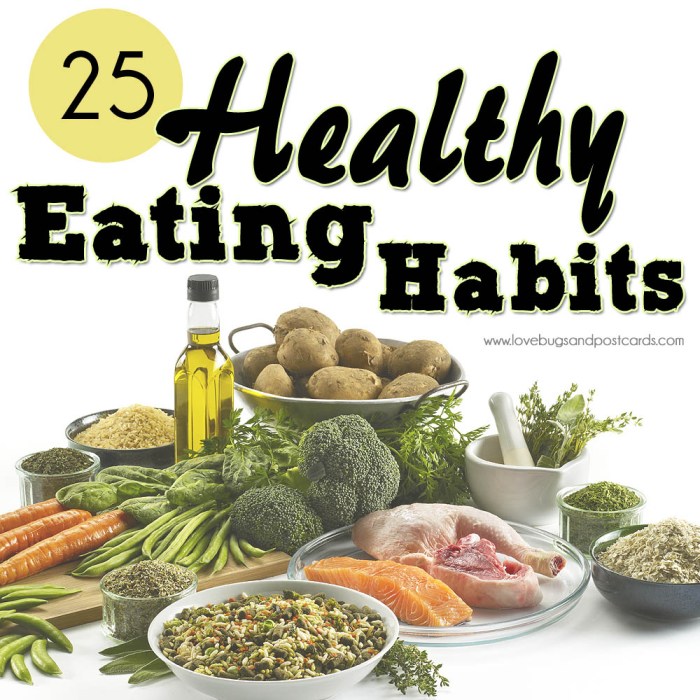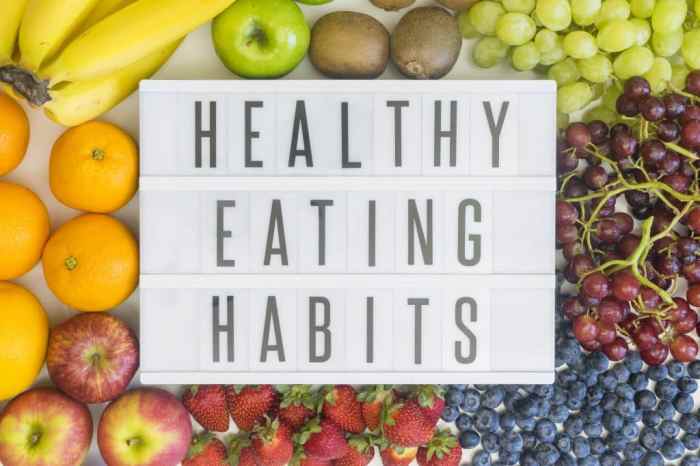Healthy Eating Habits: Fueling Your Body Right sets the stage for a journey into the world of nourishing your body with the right foods, packed with all the juicy details you need to know.
Get ready to dive into the benefits, components, tips, and barriers of maintaining a healthy diet that will leave you feeling energized and ready to take on the world.
Benefits of Healthy Eating Habits

Eating a diet rich in fruits and vegetables has numerous advantages for our overall health and well-being. These foods are packed with essential nutrients that are vital for proper bodily functions and can help reduce the risk of chronic diseases.
Advantages of Fruits and Vegetables
- Fruits and vegetables are high in vitamins, minerals, and antioxidants that boost our immune system and help fight off infections.
- They are low in calories and high in fiber, aiding in weight management and promoting a healthy digestive system.
- The fiber content in fruits and vegetables can also lower cholesterol levels and reduce the risk of heart disease.
Improving Well-being and Reducing Chronic Disease Risk
Healthy eating habits can significantly improve our overall well-being by providing the necessary nutrients for optimal body functions. By consuming a balanced diet, we can reduce the risk of chronic diseases such as obesity, diabetes, and certain types of cancer.
Essential Nutrients and Their Benefits
| Nutrient | Benefits |
|---|---|
| Vitamin C | Boosts immune system and aids in collagen production for healthy skin. |
| Potassium | Regulates blood pressure and supports proper muscle function. |
| Fiber | Promotes healthy digestion, reduces cholesterol levels, and aids in weight management. |
Components of a Healthy Diet: Healthy Eating Habits

Eating a balanced diet is essential for maintaining good health. This includes incorporating various food groups, practicing portion control, and staying hydrated.
Major Food Groups in a Balanced Diet
- Fruits and Vegetables: Rich in vitamins, minerals, and fiber, these are essential for overall health and disease prevention.
- Proteins: Sources like lean meats, poultry, fish, beans, and nuts provide the body with necessary amino acids for muscle growth and repair.
- Whole Grains: These include foods like brown rice, whole wheat bread, and oats, which offer fiber, vitamins, and minerals for sustained energy.
- Dairy or Dairy Alternatives: Important for calcium and vitamin D intake, which are crucial for bone health.
Importance of Portion Control and Moderation
Keeping portions in check is key to preventing overeating and weight gain. By understanding appropriate portion sizes and listening to your body’s hunger cues, you can maintain a healthy weight and overall well-being.
Significance of Hydration for Overall Health
Staying hydrated is vital for numerous bodily functions, including regulating body temperature, aiding digestion, and flushing out toxins. Drinking an adequate amount of water each day helps maintain proper hydration levels and supports optimal health.
Tips for Developing Healthy Eating Habits
Developing healthy eating habits can be challenging, but with the right strategies, it can become a sustainable lifestyle. Here are some tips to help you make better food choices and improve your overall health:
Meal Planning and Preparation
Planning your meals ahead of time can help you make healthier choices and avoid impulsive decisions. Try creating a weekly meal plan that includes a variety of fruits, vegetables, whole grains, lean proteins, and healthy fats. Preparing meals in advance and storing them in portion-controlled containers can also save time and prevent you from reaching for unhealthy options when you’re hungry.
Reading Food Labels Effectively
Understanding how to read food labels is essential for making informed decisions about your nutrition. Pay attention to serving sizes, calories, fat content, sugar, and sodium levels. Look for products with fewer additives and ingredients you can pronounce. Focus on whole foods and try to limit processed foods high in added sugars and unhealthy fats.
Healthy Snack Options
When cravings strike between meals, having healthy snack options on hand can help you avoid reaching for chips or candy. Opt for nutrient-dense snacks like fresh fruit, raw vegetables with hummus, Greek yogurt, nuts, or whole-grain crackers with cheese. These options can keep you satisfied and provide essential nutrients to fuel your body throughout the day.
Common Barriers to Healthy Eating
Adopting healthier eating habits can be challenging due to various obstacles that individuals may face. These barriers can include time constraints, budget limitations, emotional eating, and stress. Overcoming these challenges is crucial for promoting overall well-being and maintaining a nutritious diet.
Time Constraints, Healthy Eating Habits
Many people struggle to make time for meal preparation and planning due to busy schedules. This often leads to relying on convenient but less healthy food options like fast food or processed snacks.
- Plan and prep meals in advance to save time during the week.
- Utilize time-saving cooking methods like batch cooking or using a slow cooker.
- Opt for quick and easy healthy recipes that require minimal preparation.
Budget Limitations
Financial constraints can make it difficult to afford nutritious foods, leading to a reliance on cheaper, less healthy options.
- Shop for seasonal produce and sales to save money on fresh fruits and vegetables.
- Buy in bulk for items like grains, beans, and nuts to reduce costs per serving.
- Consider frozen or canned fruits and vegetables as affordable alternatives to fresh produce.
Emotional Eating and Stress
Emotional eating and stress can trigger unhealthy food choices as a coping mechanism, leading to overeating or consuming comfort foods high in sugar and fat.
- Practice mindfulness and stress-reducing techniques like yoga or meditation to manage emotional triggers.
- Seek support from a therapist or counselor to address underlying emotional issues related to food.
- Find alternative ways to cope with stress, such as exercise, hobbies, or social activities.
